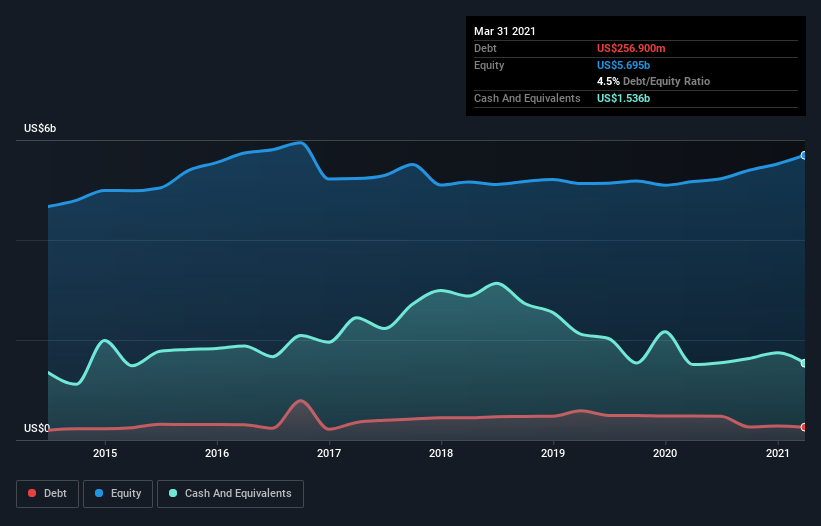First Solar (NASDAQ:FSLR) Seems To Use Debt Quite Sensibly
- Oops!Something went wrong.Please try again later.
Legendary fund manager Li Lu (who Charlie Munger backed) once said, 'The biggest investment risk is not the volatility of prices, but whether you will suffer a permanent loss of capital.' It's only natural to consider a company's balance sheet when you examine how risky it is, since debt is often involved when a business collapses. We can see that First Solar, Inc. (NASDAQ:FSLR) does use debt in its business. But is this debt a concern to shareholders?
When Is Debt Dangerous?
Debt assists a business until the business has trouble paying it off, either with new capital or with free cash flow. Part and parcel of capitalism is the process of 'creative destruction' where failed businesses are mercilessly liquidated by their bankers. However, a more common (but still painful) scenario is that it has to raise new equity capital at a low price, thus permanently diluting shareholders. Of course, the upside of debt is that it often represents cheap capital, especially when it replaces dilution in a company with the ability to reinvest at high rates of return. When we think about a company's use of debt, we first look at cash and debt together.
View our latest analysis for First Solar
How Much Debt Does First Solar Carry?
The image below, which you can click on for greater detail, shows that First Solar had debt of US$256.9m at the end of March 2021, a reduction from US$482.4m over a year. However, it does have US$1.54b in cash offsetting this, leading to net cash of US$1.28b.
How Healthy Is First Solar's Balance Sheet?
We can see from the most recent balance sheet that First Solar had liabilities of US$669.3m falling due within a year, and liabilities of US$744.8m due beyond that. On the other hand, it had cash of US$1.54b and US$817.1m worth of receivables due within a year. So it actually has US$938.6m more liquid assets than total liabilities.
This short term liquidity is a sign that First Solar could probably pay off its debt with ease, as its balance sheet is far from stretched. Succinctly put, First Solar boasts net cash, so it's fair to say it does not have a heavy debt load!
On top of that, First Solar grew its EBIT by 65% over the last twelve months, and that growth will make it easier to handle its debt. There's no doubt that we learn most about debt from the balance sheet. But it is future earnings, more than anything, that will determine First Solar's ability to maintain a healthy balance sheet going forward. So if you're focused on the future you can check out this free report showing analyst profit forecasts.
Finally, a company can only pay off debt with cold hard cash, not accounting profits. First Solar may have net cash on the balance sheet, but it is still interesting to look at how well the business converts its earnings before interest and tax (EBIT) to free cash flow, because that will influence both its need for, and its capacity to manage debt. Over the last two years, First Solar saw substantial negative free cash flow, in total. While that may be a result of expenditure for growth, it does make the debt far more risky.
Summing up
While it is always sensible to investigate a company's debt, in this case First Solar has US$1.28b in net cash and a decent-looking balance sheet. And it impressed us with its EBIT growth of 65% over the last year. So we don't have any problem with First Solar's use of debt. The balance sheet is clearly the area to focus on when you are analysing debt. But ultimately, every company can contain risks that exist outside of the balance sheet. We've identified 4 warning signs with First Solar (at least 1 which is concerning) , and understanding them should be part of your investment process.
If you're interested in investing in businesses that can grow profits without the burden of debt, then check out this free list of growing businesses that have net cash on the balance sheet.
This article by Simply Wall St is general in nature. It does not constitute a recommendation to buy or sell any stock, and does not take account of your objectives, or your financial situation. We aim to bring you long-term focused analysis driven by fundamental data. Note that our analysis may not factor in the latest price-sensitive company announcements or qualitative material. Simply Wall St has no position in any stocks mentioned.
Have feedback on this article? Concerned about the content? Get in touch with us directly. Alternatively, email editorial-team (at) simplywallst.com.


